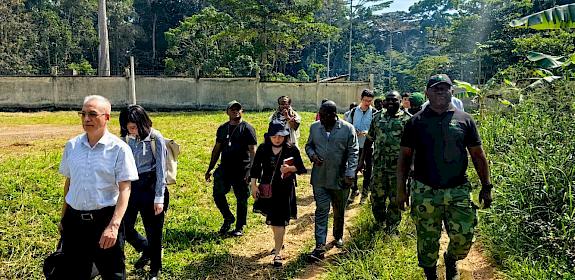Links between biodiversity and community health examined
Hyderabad, India, 11th October 2012—The importance of operationalizing links between conservation and grassroots development in the fields of biodiversity and community health were highlighted during a side event held earlier this week at the meeting of the Convention on Biological Diversity (CBD) currently underway in Hyderabad, India.
Attended by more than 90 people, the event included keynote messages from Dr Braulio Ferreira de Souza Dias, the Executive Secretary to CBD, Dr Hem Pande, CBD Focal point for India, Dr Balakrishna Pisupati, Chair of the National Biodiversity Authority of India, and representatives from United Nations University-Institute of Advanced Studies (UNU-IAS), United Nations Development Programme’s (UNDP) Equator Initiative, United Nations Environment Programme (UNEP), Foundation for Revitalisation of Local Health Traditions (FRLHT) and TRAFFIC.
The side event attempted to bring together the various institutions working on common issues relating to medicinal plant conservation, and discussed the creation of an international initiative on Biodiversity and Community Health.
Although the links between biodiversity and health are well recognized, the need to strengthen traditional understanding and practices relating to health at the community level has received insufficient attention in planning processes to date. A comprehensive assessment of the many factors contributing to health—including biological resources, knowledge and human resources, socio-cultural resources and related policy processes—should involve attention to medicinal plant and animal products, dietary and nutritional aspects, access to these resources, ecosystem integrity, landscape values, rights of practitioners and opportunities for livelihood enhancement.
The event was co-ordinated by UNU-IAS, with speakers including Eileen de Ravin, who spoke about UNDP’s Equator Initiative, while both Lourdes Cardozo Laureano—the 2012 Equator Initiative winner from Brazil and Yolanda Teran, a member of the Kichwa Indian community in Ecuador spoke about the importance of an holistic view of nature protection, and presented examples of community pharmacies based on medicinal plants.
Other speakers included FRLHT’s Darshan Shankar, who emphasized the significance of conservation work in India including the largest in situ conservation project on medicinal plants in the tropical world. He also highlighted the need for sustained investment in enterprise development. UNEP’s Mohammed Sassey stressed how biodiversity and health transverse all areas of life, and hence emphasized the need for an holistic approach to sustainable use and conservation.
Speaking at the event, TRAFFIC’s Anastasiya Timoshyna, Medicinal Plants Programme Leader drew attention to the significant and increasing global trade in medicinal plants, which is threatening the survival of some medicinal plant species and the health and livelihoods of people who depend upon them. She emphasized the need for urgent action to assess the use, trade and threat status of key biological resources, and the need for development of appropriate management plans to ensure sustainable use of such resources.
Timoshyna also drew attention to use the FairWild Standard—a set of best practice guidelines for sustainable harvesting and equitable trade in wild-collected medicinal plants, and how the Standard can be implemented through community participation, local and national policies, as well as forming the basis for sustainable sourcing in the private sector, including collectors and field producers.
Fairwild is used as a case study in a UNU IAS report written in collaboration with the UN Environment Programme (UNEP), the Foundation for Revitalisation of Local Health Traditions (FRLHT), ETC-COMPAS and the UN Development Programme (UNDP) Equator Initiative. http://biodiversity-l.iisd.org/news/unu-ias-policy-report-describes-health-and-biodiversity-linkages/
“A multi-stakeholder approach is essential for ensuring the sustainable use of medicinal plants, including engagement of harvesting communities, private sector along trade chains, resource managers, and civil society,” said Timoshyna.
TRAFFIC welcomes the increasing cooperation between the CBD Secretariat and World Health Organization (WHO). Of particular relevance to the issue of Biodiversity and Health are the WHO/IUCN/WWF/TRAFFIC Guidelines on Conservation of Medicinal Plants which, once finalized and endorsed, should provide a framework for sustainable use of such resources, and will have particular relevance to delivery of the CBD’s Aichi Biodiversity Targets and the Global Strategy for Plants Conservation (GSPC). A TRAFFIC-WWF position paper on the GSPC. A discussion paper on the event.




